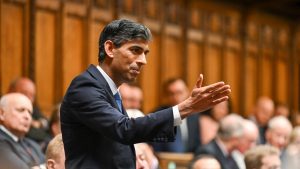United Kingdom – Former United Kingdom Prime Minister Rishi Sunak offered his perspective on the ongoing Rishi Sunak India tariffs controversy on Friday, emphasizing that nations must prioritize their own interests while building relationships founded on trust rather than transactional exchanges. Speaking at a global summit, Sunak addressed the tariffs imposed by US President Donald Trump on India, providing insights into international diplomacy and the evolving global order.
National Interest Takes Priority

In his comments on the Rishi Sunak India tariffs situation, the former British leader affirmed that every country has the fundamental right to act according to its national interests. “I think every country is gonna work on its own national interest. And that is entirely right,” Sunak stated, acknowledging the legitimacy of India’s approach to navigating the current trade tensions with Washington.
This perspective on the Rishi Sunak India tariffs discourse reflects a pragmatic understanding of international relations, where sovereign nations must balance multiple competing interests while maintaining diplomatic relationships. Sunak’s remarks suggest that India’s response to American tariffs should be viewed through the lens of national self-interest rather than political pressure.
Critique of Transaction-Based Politics
A central theme in Rishi Sunak India tariffs commentary was his criticism of transaction-based politics in international relations. The former prime minister described such approaches as a “shame,” arguing that relationships built purely on transactional exchanges yield limited long-term benefits.
“When you base your relationships on trust, I think they can, over time, be more powerful,” Sunak emphasized. This philosophy stands in contrast to the current approach underlying the tariff disputes, where economic pressure is used as a tool to achieve immediate political objectives. The Rishi Sunak India tariffs discussion highlighted how trust-based diplomacy can navigate complex international challenges more effectively than purely transactional methods.
The Brexit Example
To illustrate his point about trust-based relationships in the Rishi Sunak India tariffs context, the former prime minister cited his own experience working with European Union Commission President Ursula von der Leyen. During his tenure as Britain’s leader, Sunak and von der Leyen successfully navigated numerous complex issues regarding the UK’s post-Brexit relationship with the EU.
This example in the Rishi Sunak India tariffs narrative demonstrates how establishing personal trust and mutual respect between leaders can facilitate problem-solving even on contentious matters. The UK-EU negotiations involved intricate trade arrangements, border protocols, and sovereignty questions—challenges that required more than transactional bargaining to resolve effectively.
The Changing Global Order
Addressing the broader implications of the Rishi Sunak India tariffs situation, the former prime minister acknowledged that the international system has fundamentally transformed. “The old global order, which I grew up with, is gone. I don’t think it’s coming back,” Sunak declared, painting a picture of a dramatically different geopolitical landscape.
This observation about the Rishi Sunak India tariffs environment reflects the shift from a unipolar or bipolar world structure to a more complex, multipolar system. The former British leader identified clear trends emerging from this transformation, including increased multipolarity and nations focusing on leveraging their unique strengths in the global arena.
Also Read: Michigan Plane Blast Tragedy: 3 Killed in Devastating Crash
Multipolarity and National Strengths
The Rishi Sunak India tariffs analysis included important insights about the emerging multipolar world order. “A couple of themes are clear. I see more multipolarity, and countries will focus on their own strengths,” Sunak explained, suggesting that nations will increasingly pursue independent paths based on their comparative advantages rather than aligning strictly with traditional power blocs.
This multipolar framework in the Rishi Sunak India tariffs discussion provides context for understanding India’s position. As a major economy with significant demographic and technological strengths, India represents one of the emerging poles in this new global configuration, capable of charting its own course despite external pressures.
Understanding the US Tariff Structure
The Rishi Sunak India tariffs conversation occurs against the backdrop of substantial American trade restrictions. The United States has imposed a fifty percent tariff on Indian goods, including a twenty-five percent penalty specifically targeting Russian energy purchases. These measures represent one of the most significant trade actions taken against India in recent memory.
Washington justifies these tariffs by arguing that India’s transactions with Russia provide funding for Moscow’s war against Ukraine. However, the Rishi Sunak India tariffs discussion implicitly recognizes the complexity of this issue, acknowledging that nations must balance multiple considerations in their foreign policy decisions.
India’s Energy Security Rationale
Central to the Rishi Sunak India tariffs debate is India’s consistent position on its energy purchases. New Delhi has maintained that its energy procurement decisions are driven by market forces and national security requirements rather than geopolitical alignment. India defends its right to secure affordable energy for its population, particularly given its status as the world’s most populous nation with significant development needs.
This stance, implicitly supported by the Rishi Sunak India tariffs commentary, reflects the tension between Western geopolitical objectives and developing nations’ economic imperatives. India’s energy security concerns cannot be easily dismissed, especially when the country must provide reliable, affordable power to over 1.4 billion citizens.
Implications for Future Diplomacy
The Rishi Sunak India tariffs perspective offers valuable lessons for international relations in the emerging global order. His emphasis on trust over transactions suggests that sustainable diplomatic relationships require deeper foundations than immediate quid pro quo exchanges. As nations navigate the turbulent waters of trade disputes, geopolitical competition, and energy security challenges, the principles articulated in the Rishi Sunak India tariffs discussion become increasingly relevant.
The former prime minister’s comments remind policymakers that while national interests must be prioritized, the manner in which countries pursue those interests—whether through trust-building or transactional pressure—will determine the quality and durability of international partnerships in the years ahead.

